Living on the Island of Gods is easy when you have an unlimited budget. Unfortunately, not everyone can afford such luxury, and life circumstances can sometimes take a dramatic turn. So, what to do if your income is limited, but Bali still has a hold on you? Start by reading our guide—it might help you cut costs without significantly compromising your quality of life.

Visas
If you plan to stay on the island for an extended period, it’s best to get a visa that minimizes the need for frequent visa runs. These can often end up costing more. Options include digital nomad visas or various KITAS permits. Alternatively, the simplest option is a tourist visa. It can be applied for independently on the immigration website, costing 1.5 million IDR (around $100) for two months. This visa can be extended twice for the same period at the same cost, allowing you to stay on the island for six months without visa runs.
Communication
Avoid expensive operators like Telkomsel. While their coverage is wider, you won’t notice much difference in populated areas compared to cheaper options like XL. For just 50k IDR, you can get 10GB of data and unlimited WhatsApp usage with XL.
Housing

Luxury villas are great, but there are more affordable and pleasant options available. Housing prices are rising due to the tourist influx, but deals can still be found on platforms like Facebook Marketplace, OLX, and Rumah123. Posting in large Facebook real estate groups or commenting can connect you with local agents.
For example, the price of a decent house in Nusa Dua for one month will likely only get you a doghouse in Canggu for a week. Keep that in mind. The most affordable housing close to popular areas can be found in Denpasar, where most Indonesians live, renting so-called Kos for 900k IDR and up. While it might be hard to secure housing at that price, for 1.5–2 million IDR, you can find a decent room if you search well. There are also apartments and townhouses available in Denpasar at relatively affordable prices.
In general, you can still find a house the traditional way—by driving around your desired area and looking for “disewakan” (for rent) signs. However, keep in mind that many houses are rented out for long terms, and committing to a year or six months can significantly impact the price.
Transport

If you’re staying for a while, buying a second-hand motorbike is the most economical choice. Rentals are more expensive and typically cost 900k–1.2 million IDR per month, depending on the model. For purchases, note that vehicles can’t be registered to you without a KITAS, but buying one under someone else’s name is standard in Indonesia.
When renting, make sure to clarify who is responsible for changing the oil and tires. It’s better to have a contract that specifies everything clearly. There’s no need to leave your passport, driver’s license, or money as a deposit—bikes can be rented without providing any of these. While bike thefts are rare in Bali, they do occasionally happen. Make sure to lock your bike at night or, even better, park it inside a courtyard.
By the way, if a parking attendant approaches you asking for money, this is completely normal. There’s no need to get upset, create drama, or try to avoid paying. Just give them 2k IDR and be on your way. Everyone pays for parking here, not just foreigners.
Food

Cheap and filling street food is widely available in Indonesia, as long as you’re not put off by its appearance. Fried rice with chicken generally looks decent, but some other dishes might appear unappetizing to an inexperienced foodie. However, they usually taste quite good. Find a few favorite local dishes, and you’ll have no trouble eating affordably. A typical meal costs 20–30k IDR, though portions are generally quite small.
The alternative is to cook at home. Every neighborhood has vegetable stalls and fresh chicken sellers. Vegetables are very cheap, and a whole plump chicken costs just 70–80k IDR, which can last several meals depending on your appetite. If you’re coming from a place like Thailand, you might be disappointed by the limited selection of street food or grocery ingredients, but it’s just a matter of local preferences.
For fresh (not frozen) pork, fish, or beef at reasonable prices, you’ll need to visit the market, which most likely exists in your area but opens as early as 4 AM and closes by 9 AM. Night owls might find this inconvenient. If you feel a price is too high or you’re buying in bulk, haggling is normal and expected. Keep in mind that as a foreigner, some sellers may try to charge you more.
However, this is not always the case, and not all vendors do it. That said, don’t overdo it—bargaining over something as minor as a parking fee would seem ridiculous.
Entertainment

Yes, even accessing most beaches here requires a fee, although the cost is usually symbolic. That said, it’s still a very affordable activity. Exploring all of Bali’s beaches could take several months—there are so many, and they are diverse and incredibly picturesque. In addition to beaches, the island offers stunning mountains, volcanoes, waterfalls, winding roads, and breathtaking views. If you love nature and nothing else, Bali can be an inexpensive destination in this regard.
As for nightlife—entry to clubs and bars is generally free, although there are exceptions, such as beach clubs, where you’re likely to be asked to pay a non-refundable deposit that can be spent on food and drinks.
Alcohol in Bali is relatively expensive, but the local arak, priced at 25–30k IDR, is a more budget-friendly option. Beer is also reasonably affordable. It’s worth noting that roadside shops, which often sell fuel as well, usually have cheaper beer than chain stores like Circle K or Minimart. There are also specialized alcohol shops where prices are relatively low.
You’ll often come across announcements for free workshops and spiritual practices. During local holidays, residents also organize fascinating religious shows. For example, before Nyepi (the Balinese Day of Silence), you can witness enormous demon statues paraded through the streets—a truly remarkable spectacle.
Clothing
If you avoid high-end boutiques, you can dress at Indonesian prices, which means very cheaply. The only challenge might be sizing. If your measurements significantly exceed typical Indonesian sizes (e.g., shoe size 45 or height over 180 cm), finding clothing tailored for Indonesians could be difficult. Shopping can be done on online platforms or at stores and supermarkets located in non-tourist areas, such as the Matahari chain. The selection of casual clothing is usually decent and sufficient, and the same goes for footwear.
Online Shopping
The most affordable way to purchase goods or devices, or multiple items from a single online shop, is by using online marketplaces. For example, if you want to buy a guitar and its accessories while saving on shipping, you can use a store like this. It’s important not to buy from sellers with low or no ratings. Additionally, after receiving your order, make sure to record an unboxing video. This can be helpful if the item does not match the order. Do not confirm receipt of the item on the website until you have verified that everything is in order.
Discounts and Deals
Use apps like Zomato or Fave to find discounts and promotions at restaurants. Many establishments offer daily deals, such as two-for-one cocktails or specials on certain dishes.
Insurance
Travel and health insurance are essential, as medical care in Indonesia can be expensive without it. Insurance can be purchased before your trip or upon arrival and is invaluable in emergencies.
Minimum Budget
Let’s estimate the minimum cost of living in Bali:
• Housing: 2.5–3 million IDR.
• Motorbike rental: 1 million IDR.
• Visa: 1.5 million IDR every two months (around 5 million for a digital nomad visa valid for one year).
• Food: 3 million IDR/month if you cook at home and eat at local warungs.
• Communication: 100k IDR/month.
The total comes to approximately 7.6 million IDR (490 USD) per month, excluding entertainment, visa-run flights, fuel, and insurance. This is a basic survival budget, but for a more comfortable experience, it’s best to allocate more.
Bali offers much to explore and enjoy, so with careful planning, you can live economically while still experiencing the magic of the Island of Gods.







You can add one right now!